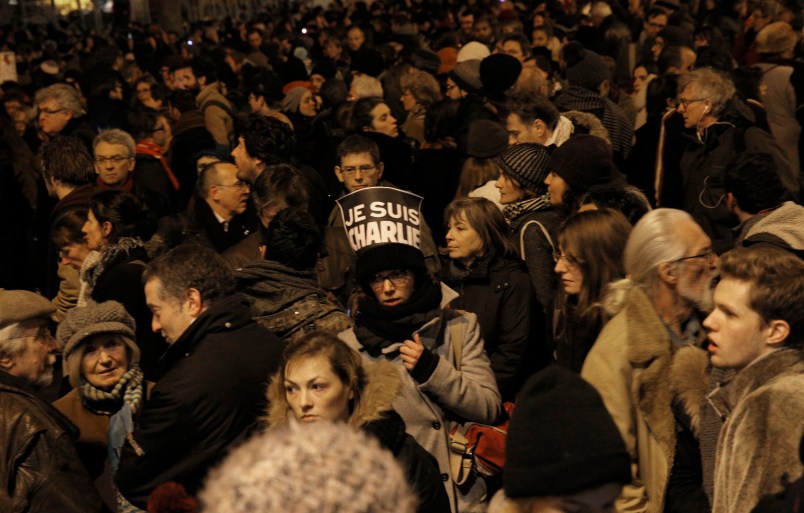PARIS — The mood in Paris’ 11th Arrondissement was subdued late Wednesday afternoon, as fans of Charlie Hebdo came to pay their respects. Demonstrators held up signs and placards exclaiming “Je suis Charlie” (I am Charlie) at the scene of the tragedy, as thousands of French people posted the phrase on social media. Scrums of news crews waited, though it was not clear what for. Save for the constant wail of sirens, the rest of the city seemed remarkably normal, despite an increased police presence at major transit and commerce centers.
The manhunt continues for armed terrorists who shot and killed at least 12 at the newspaper offices of Charlie Hebdo, a satirical publication known for its leftwing cartoons and articles. The attack—which French president François Hollande quickly and categorically called a terrorist attack—is the first incident of this magnitude in France post-9/11 and thus the first time the country has had to confront the tide of radical Islam that has manifested in other cities throughout the world in the past 15 years.
In keeping with France’s fiercely secular and liberal values, the government doesn’t keep official numbers of ethnic or religious minorities, but it’s estimated that as much as 10 percent of France’s population is Muslim. Despite this, foreigners are often surprised by the overtly multicultural identity of Paris when they visit the capital; in fact, France has one of the largest immigrant populations in Europe. Northern and Eastern portions of the city are dominated by foreign-born residents, and it’s not hard to find signs of a thriving Muslim culture—mosques, halal butchers and the like—that is far from homegrown.

But similar to other political moments in Europe—UKIP in the Great Britain and the right-wing Sweden Democrats party—a growing anti-immigration sentiment has risen in France. This was evidenced by the elections for the European Parliament in May of last year, when the country was shocked to learn the far-right, anti-immigrant, anti-Europe National Front Party, headed by Marine Le Pen, won 24 percent of the vote, more than any other party. Le Pen has openly expressed anti-Islamic rhetoric as part of her political views.
This political trend has ushered in an identity crisis for France, a country where liberté, egalité and fraternité are emblazoned onto nearly every public building. Indeed, today’s events will be one of the first times that French people will have to maintain those values—not stereotyping any religion, race, or preference unfairly—in the face of a brazen and horrific attack on their own city.
Aurélie Corvisy, a student journalist at License Pro Journalisme in Paris, was at the scene to show solidarity with those who were killed. She said she fears that this event could exacerbate these anti-Islamic tensions throughout France, and potentially have an impact on France’s future elections.
“Of course this will create more racism,” Corvisy said. “Now we’re already seeing tweets like ‘Hatred feeds hatred.’ Charlie Hebdo was satiric, if we can’t laugh about something that’s a problem.”
Another student journalist added: “We think that this event will help Front National for the 2017 presidential election.”
Véronique Grymann, a specialized educator said she felt particularly affected by the tragedy as she grew up in the neighborhood where it took place. She said she sincerely hopes the day’s events don’t foment more anti-Muslim sentiment in Paris.
“[Today’s event] is something really big for us,” Gryman said. “It’s complicated, I hope it will not change something. We need to not misunderstand the difference between terrorists who kill for Islam and the Islamic religion, a religion of peace.”
Grymann, who is a frequent reader of Charlie Hebdo, says she still supports the magazine and all that its stands for.
“Liberty of expression is like a institution in France. We are all Charlie today. Everyone is Charlie.”

Translation of interviews by Nicolas Rabrenovic
Rosie Spinks is a freelance journalist and editor based in Paris. Her work appears in publications including The Guardian, Slate, Marie Claire, GOOD, Outside, Sierra Magazine, The Ecologist, Dwell, Fest300 and others. In possession of two passports and nomadic tendencies, she grew up in L.A. and has reported and lived in cities in Europe and Africa.






